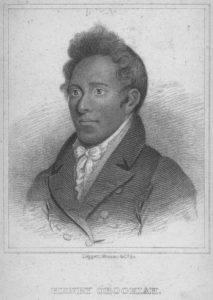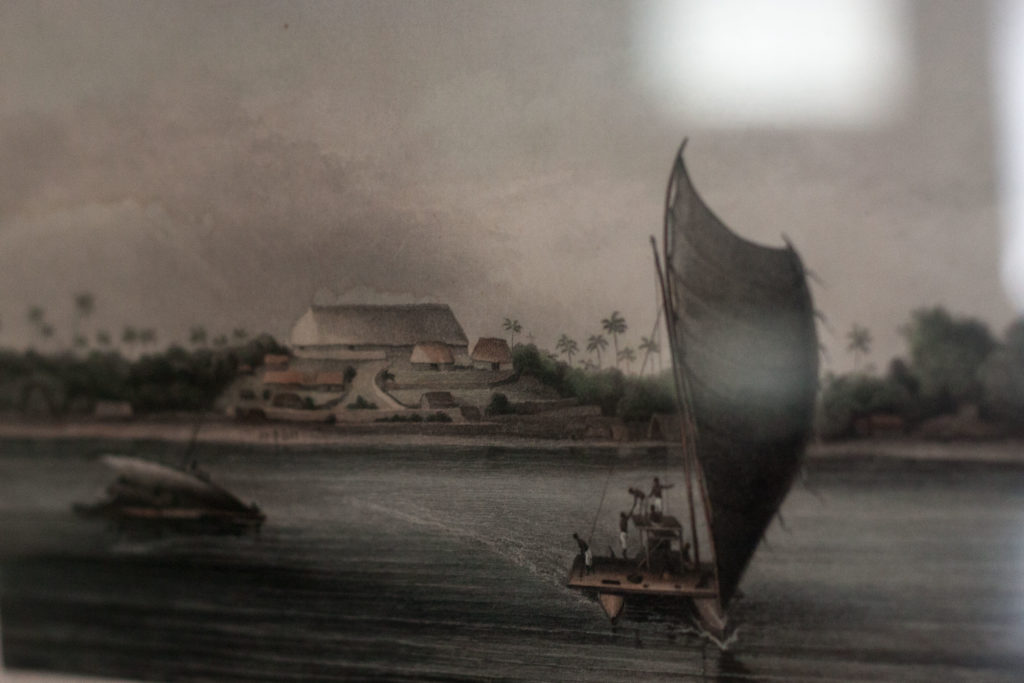Have a drink with: Henry Opukaha’ia
Aloha oe.
Ask him about: No pineapple on Pepe’s, right?
We’ve talked before about how Connecticut has given the world a wide assortment of innovations, some good, some bad: speed limits, law schools and scary Puritan judges, sure, but also Pepe’s pizza, submarines, constitutional government (maybe?) and P.T. Barnum.
With a check mark in each column: Henry Opukaha’ia. Good news: remarkable Hawaiian visits Connecticut, absolutely crushes scholarly agenda and impresses the pants off of the leading religious voices of his day. Bad news: his fan club includes a legion of New England missionaries bound for the Pacific.
Henry Opukaha’ia – whose name was anglicized to Henry Obookiah during his lifetime in the United States – had a rough start in life. When he was only a teenager, his parents and younger brother were killed in the civil wars by which Kamehameha gained control of the Hawaiian Islands. Orphaned and unsure of what the future held, Henry joined an American captain on his ship and returned to New Haven, Connecticut after the completion of a sealing voyage. He began to learn English, and was tutored by some of New Haven’s Yale notables.

Henry was a gifted student, and gained the attention of a group called the American Board of Commissioners for Foreign Missions (ABCFM), which in turn established the Foreign Mission School in, of all places, Cornwall, Connecticut. As many scholars have noted, the isolation was not unintentional: there was so little to do in Cornwall that focusing on the divine was pretty much the only thing on offer. The school opened in 1817 and, all in all, trained about a hundred people from Asia, the Pacific islands and from Native American communities in classical Western civilization and religious studies.
At the Foreign Mission School, Henry not only gained English fluency but studied Latin and Hebrew (he found Hebrew easy to learn, seeing similarities to Hawaiian language structure), and using his skills to begin creating a primer of the Hawaiian language, including a translation of the Book of Genesis. He hoped – and his teachers hoped for him – that he would return to Hawaii to convert the locals.
Intentions were certainly good, as they often are; the ABCFM felt that locals would be better received as missionaries than random white folks, and in many ways saw their work as a means to counter stuffy New England prejudices:
“Obookiah’s visit to this part of the country…has silenced the weak but common objection against attempting to enlighten the Heathen, that they are too ignorant to be taught…We have first enslaved our fellow-beings, then degraded them by every menial service, deprived them of the means of mental improvement, and almost of human intercourse; and because, under these circumstances, people of colour are devoid of knowledge, we have hastened to the irrational conclusion, that all the Heathen are a race of idiots…But the appearance of Obookiah has done much in this region to wipe off this disgrace thrown upon the Heathen, and to remove the objection so often made.”
They missed the part, though, where, as one popular saying put it, “the flag follows the missionary, and commerce follows the flag.”
Henry’s death sent the missionary. He himself did not make it back to Hawaii: still in Connecticut, Obookiah died in 1818 of typhus at only 26 years of age. Hawaii – then known as the Sandwich Islands – was in the early 19th century not tops on anyone’s travel list, particularly since and because of the fact that the locals had shown no particular qualms about bludgeoning Britain’s foremost explorer (to be fair: James Cook reaped the consequences of following the Ghostbusters Rule on Divinity).
The Memoirs of Henry Obookiah changed that. The Memoirs, a short book published shortly after Obookiah’s death, was a neat hagiography written by Henry’s teacher Edwin Dwight, and it disseminated the convenient, groomed arc of Henry’s life: a noble savage, orphaned by the cruelty of his native people and taken in to God and learning by the grace of benevolent white men (one of the most commonly repeated stories puts Henry literally sitting on the steps of a Yale building, weeping for want of education).
Henry’s intentions mattered less than his interpreters’ desire to claim him fully: some of his last words, “Aloha oe,” actually translate as a Hawaiian farewell. Dwight rendered them as a very Biblical “My love be with you.”
Because readers saw a dramatic, feel-good transformation – from a boy who described Hawaiian gods in pidgin English (“Me go home, put ‘em in a fire, burn ‘em up.”) to a charming young man who studied Euclidean geometry and could read the Hebrew Bible – the Memoirs ended up serving as a motivational tract for a generation of Christian missionaries and their donors. Henry’s story specifically inspired evangelists to focus their efforts on the Sandwich Islands, where an influx of Western do-gooders eventually opened the door to not only religion but trade, and the American annexation of Hawaii.
Fun Facts:
Edwin Dwight, the author of the Memoirs of Henry Obookiah, was a relative of then-Yale President Timothy Dwight, who was one of the original commissioners appointed for the ABCFM, and who, it can at least be said, had somewhat softened the “you go to hell and you die!” theology of his fire-and-brimstone grandfather Jonathan Edwards.
Henry Obookiah is not the only student legacy of the Foreign Mission School. As Sarah Vowell explains in her book Unfamiliar Fishes, a history of American occupation of Hawaii, the school was closed in 1826, in large measure due to community uproar over marriage of two of its Cherokee students to local white women. (Circumstances did not improve for the newlyweds; one of them, Elias Boudinot, was instrumental in a minority faction’s execution of the 1835 Treaty of New Echota, which ceded Cherokee land to the United States government and led to the tribe’s forced removal to Oklahoma. The larger Cherokee nation did not support the treaty, and killed Boudinot in 1839.)
The remains of Henry Opukaha’ia were repatriated to Hawaii in 1993; however, his cenotaph remains in Cornwall, Connecticut.
Want to do Henry a favor in return? You can now learn Hawaiian on Duolingo. (The language was banned in education on the islands in 1896, and well into the 1970s was regarded as a “foreign language” for educational purposes. Revitalization efforts have continued.)
Additional Reading:
Sarah Vowell, Unfamiliar Fishes (2014)
Edwin Welles Dwight, The Memoirs of Henry Obookiah (1819)
